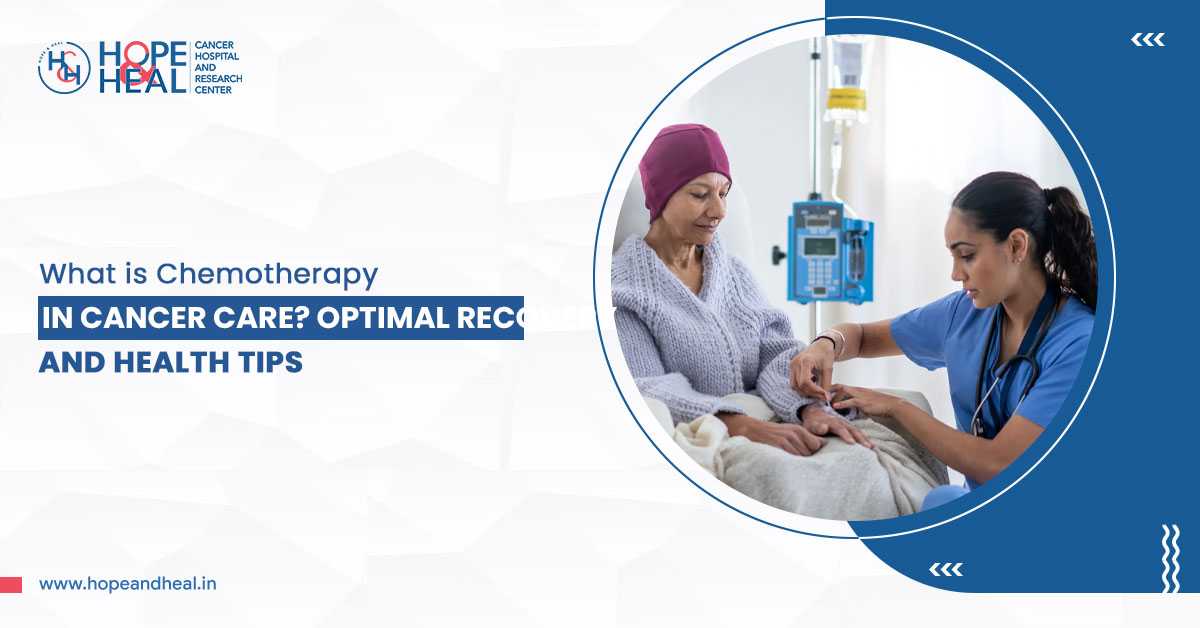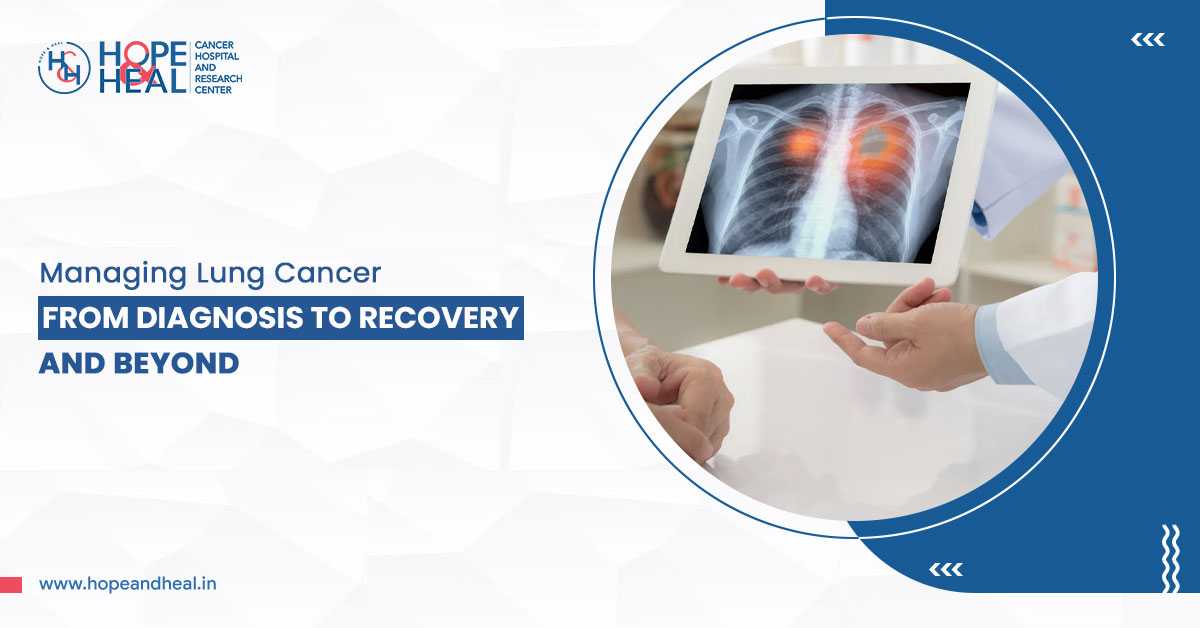Both men and women can develop lung cancer, which is one of the most prevalent and fatal cancers across the globe. Although smoking is frequently linked to it, other risk factors like exposure at work, genetic factors, and environmental pollutants can also play a role in its development.
The good news is that there are certain ways to avoid lung cancer, and people can greatly lower their risk by taking the appropriate precautions. If you also want to learn about the steps you can take for preventing lung cancer then schedule an appointment with the top lung cancer specialist in Siliguri at Hope & Heal Cancer Hospital and Research Centre.
What Is Lung Cancer?
When abnormal cells in the lungs start to grow uncontrollably and form a tumor, you can develop cancer. Non-small cell lung cancer (NSCLC) and small cell lung cancer (SCLC) are the two main subtypes of lung cancer. About 80% of all cases of lung cancer are of the more prevalent form, NSCLC. Early detection and prevention are essential for survival because both types have the potential to spread to other sections of the body.
Smoking is the most well-known risk factor for lung cancer. Tobacco smoke includes dangerous substances that injure the cells lining the lungs. Over time, this damage raises the chance of lung cancer. It has been studied that around 80-90% of lung cancer is associated with smoking. You must remember the fact that exposure to second-hand smoke can also raise your risk of lung cancer even if you don't smoke.
Effective Strategies To Prevent Lung Cancer
1. Reduce exposure to environmental pollutants
An important risk factor for lung cancer is environmental pollution. Lung cancer risk has been associated with air pollution in urban areas. Understanding the environmental elements that can impact lung health is crucial since industrial operations and vehicle emissions can occasionally cause the air quality to deteriorate.
Try the following measures to lessen your exposure to pollutants:
-
Stay inside on days with poor air quality or high levels of air pollution.
-
Use air purifiers at home to lessen indoor pollution.
-
Wear a mask, particularly if you work in a dusty or polluted location.
-
Avoid strenuous physical activity, such as exercising outside, while pollution levels are high.
2. Quit smoking and avoid second-hand smoke
Quitting smoking is the most effective approach to avoid lung cancer. The best thing you can do for your lung health is to stop smoking, regardless of whether you now smoke or have smoked in the past. Even while undergoing lung cancer treatment in Siliguri, the doctor will advise you to stop smoking. It is true that even for chronic smokers, stopping smoking dramatically lowers the risk of lung cancer. After quitting, the body starts to repair, and the risk gets lower every year.
If you're having trouble quitting, think about getting support from counseling, nicotine replacement treatment, or smoking cessation programs. These techniques might provide you the encouragement and resources you need to successfully stop smoking. Avoid being around second-hand smoke as well. Encourage smokers to give up if you are near them, and make sure you are always in a smoke-free area.
3. Eat a healthy diet and follow proper lifestyle
It is advised by lung experts that preventing lung cancer requires leading a healthy lifestyle. In addition to being vital for general health, a balanced diet, regular exercise, and stress management can reduce the chance of lung cancer and many other illnesses. Herein, you must focus on eating a diet high in whole grains, lean meats, fruits, and vegetables as well as healthy fats.
A diet rich in vitamins, minerals, and antioxidants may help protect the lungs and lower the risk of cancer. Additionally, exercising on a regular basis is also crucial. Exercise enhances lung function, boosts immunity, and aids in maintaining a healthy weight. Every week, try to get in at least 150 minutes of moderate-intensity exercise.
4. Schedule routine lung check-ups
Routine medical examinations are essential for the early identification of lung cancer. Regular tests can help identify warning signs before they become serious, even if lung cancer may not showcase symptoms in its early stages. For people who are at high risk, such as those who have a history of excessive smoking or occupational exposure to hazardous substances, a low-dose CT scan is advised, which is considered the gold standard.
People between the ages of 55 and 80 who have smoked at least one pack of cigarettes a day for 30 years or more are advised to talk to their doctors about lung cancer screening. Remember that the likelihood of a successful treatment and recovery is increased by early diagnosis.
5. Maintain workplace safety to avoid occupational exposure
Workers in several occupations may be exposed to chemicals, radon, asbestos, or other dangerous substances that raise the risk of lung cancer. The presence of asbestos fibres in the air may put workers in manufacturing, mining, and construction at higher risk. Lung cancer can result from prolonged exposure to these substances, especially in smokers.
It is essential to take the appropriate safety measures if you work in an environment where you could be exposed to hazardous materials:
-
Put on protective gear, including respirators or masks, to reduce the amount of hazardous materials you inhale.
-
To reduce exposure to hazardous products, make sure your workplace complies with safety regulations.
-
Promote routine workplace health examinations to spot lung issues early.
6. Prioritize genetic counselling if you have a family history of lung cancer
Genetic counseling is recommended for those with a family history of lung cancer. Lung cancer growth may be influenced by genetic factors, and knowing your hereditary risk can help you make well-informed screening and preventative decisions.
Doctors always advise talking about your risk factors with a medical professional who can help you take preventative steps and keep a closer eye on your lung health if you have a family history of lung cancer.
7. Prevent radon exposure
Your home may contain radon, a naturally occurring radioactive gas, especially in regions where the soil contains large concentrations of uranium. After smoking, it is the second most common cause of lung cancer. Because radon exposure is odorless and invisible, it is essential that you test your house for radon.
Installing a radon mitigation system is an effective way to lessen exposure if your house has high radon levels. If you reside in an area where radon is known to be an issue, many experts advise getting a test done.
Although lung cancer is one of the most preventable forms of cancer, it is not a devastating condition especially if it has been detected at an early stage. You can considerably lower your risk of getting lung cancer by seeking preventive recommendations from the best lung specialist in Siliguri. Lung cancer can be prevented by quitting smoking, lowering exposure to occupational and environmental contaminants, scheduling regular check-ups, leading a healthy lifestyle, and being informed.
Comments (0)




